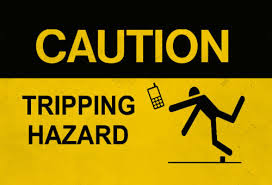stumble
英 [ˈstʌm.bəl]
美 [ˈstʌm.bəl]
- vi. 踌躇,蹒跚;失足;犯错
- vt. 使…困惑;使…绊倒
- n. 绊倒;蹒跚而行
使用频率:

记忆方法
1. 死都要贪步会跌倒.
2. 谐音“死贪步” => 绊倒、犯错误。
2. 谐音“死贪步” => 绊倒、犯错误。
英语词源
- stumble
-
stumble: [14] Stumble was probably borrowed from an unrecorded Old Norse *stumla. This would have come, along with its first cousin stumra ‘trip’, from a prehistoric Germanic base *stum-, *stam- ‘check, impede’, which also produced English stammer and stem ‘halt, check’.
=> stammer, stem - stumble (v.)
- c. 1300, "to trip or miss one's footing" (physically or morally), probably from a Scandinavian source (compare dialectal Norwegian stumla, Swedish stambla "to stumble"), probably from a variant of the Proto-Germanic base *stam-, source of Old English stamerian "to stammer," German stumm, Dutch stom "dumb, silent." Possibly influenced in form by stumpen "to stumble," but the -b- may be purely euphonious. Meaning "to come (upon) by chance" is attested from 1550s. Related: Stumbled; stumbling. Stumbling-block first recorded 1526 (Tindale), used in Rom. xiv:13, where usually it translates Greek skandalon.
- stumble (n.)
- 1540s, "act of stumbling," from stumble (v.). Meaning "a failure, false step" is from 1640s.
权威例句
- 1. They stumble across a ghost town inhabited by a rascally gold prospector.
- 他们偶然来到一个居住着一位狡诈的淘金者的废墟之城。
- 2. As he drew abreast of the man he pretended to stumble.
- 当他赶上那个男人时,他装出了要跌倒的样子。
- 3. I make it into the darkness with only one stumble.
- 我只是绊了一下,周围就变成了一片黑暗。
- 4. The sudden weakness in her legs made her stumble.
- 她突然两腿发软踉跄了一下。
- 5. Stagger and stumble suggest unsteady or uncontrolledmovement.
- stagger和stumble均指不稳的或身不由己的动作.
